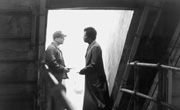COMING TO TERMS with things has become one of the new preoccupations of American cinema. Once it was enough to defeat the bad guy and win the girl. Now heroes must confront their inner demons, childhood fears, and repressed traumas. Call it the therapy movie, a very ’90s genre that shows no sign of abating. As the son of two doctors, The Sixth Sense director M. Night Shyamalan is perfectly attuned to this trend. Bruce Willis played a psychologist in his former film; here, he becomes a de facto patient. In both pictures, there’s a reverence for wellness and recovery, a hushed awe for the healer—played by Haley Joel Osment in Sixth and now Samuel L. Jackson in Unbreakable.
UNBREAKABLE
written and directed by M. Night Shyamalan with Bruce Willis, Samuel L. Jackson, and Robin Wright Penn opens November 22 at Meridian, Metro, and Oak Tree
Jackson’s character Elijah looks nothing like the board-certified type, however, with his full-length leather coat and wild ’70s Afro. After a pre-credit sequence flashback, Elijah comes looking for David (Willis), the sole survivor of a Philadelphia train wreck that claimed 131 lives. How could he be intact, unscathed? “I’m just an ordinary man,” David protests, and circumstances support him. The blue-collar security guard and his wife (Robin Wright Penn) are estranged, while his kid (Spencer Treat Clark) wants to worship him as the football hero he once was. Now this nutcase Elijah comes telling him he’s got special powers—wouldn’t you be skeptical, too?
Among its several poorly joined themes, this notion of an unsuspected, latent power explicitly links Unbreakable to superheroes and comic books, Elijah’s specialty. It also overlaps with the midlife crisis movie that Unbreakable is as well. And it’s related to the marital melodrama tossed into the m鬡nge, with impotence being the inescapable subtext of David’s conjugal woes.
THE FIRST LEVEL is the most potentially ominous and intriguing, especially as Shyamalan uses long-take scenes to communicate a kind of anticipation and dread. David’s flirting with a passenger on the ill-fated train is rendered particularly well, as is his subsequent awakening in the ER, where a fellow traveler succumbs in the out-of-focus foreground, blood blossoming slowly through the surgical gauze.
Even though his first success depended on a trick ending to lure massive audiences, Shyamalan has skills, like a young Polanski, but writing is not among them. The man has got to stop producing his own scripts.
Thus, when Jackson intones, “These are mediocre times; people are starting to lose hope,” you want to throw popcorn at the screen. We need better movies, not heroes! Even as David’s gifts of clairvoyance and strength emerge, Shyamalan insists on imbuing them with meaning. “You can’t let bad things happen to good people,” the kid insists to his father. So rather than thwarting one cardboard killer in the final act, why couldn’t David prevent Meet the Parents from being made instead? Protect us!
Unbreakable can’t escape comparisons with this summer’s superior, far more enjoyable X-Men. Like Batman before it, that film explores the idea that superpowers are a curse as much as a blessing, that the freakish differences bestowed on the crime-fighting few make them pariahs to those they defend. Superheroes are super lonely, super neurotic, and super minorities. Yet Unbreakable gives us all the mythology and angst of comic books without any of the fun. An amusing scene with David pumping iron while his son piles on the weights indicates the direction Shyamalan should’ve taken—shorn of the healing, reconciliations, and New Age platitudes.
“We are connected, you and I,” Elijah tells David, but their doppelganger, yin-and-yang relationship doesn’t live up to the portentous build Shyamalan gives it. (Although the director hasn’t lost his love of final plot twists.) In the end you wonder why having the courage to face one’s own invincibility is presented as heroism.








